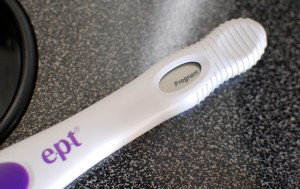This week, we are continuing our series on facing tough parenting challenges. What happens when you find out that your teenage daughter is pregnant?

Many emotional reactions would be totally normal and very justified: shock, disappointment, anger. Keep in mind, though, that the person who is probably most shocked (and maybe even disappointed and angry) is your daughter. (And if you are thinking that “she knew what she was doing and what the risks were,” that may not be the case. Research on the teen brain gives her at least a small reason to feel shocked.)
Calm down. Count to ten…slowly…before saying anything that you may regret. If she came out and told you directly, and you need to respond, try “Thank you for telling me. That must have been hard for you.” If she told you in writing, or you found out some other way when she is not around, use that breathing room to your advantage. If she told you directly and you have already reacted in a way that you now regret, it is never too late for an apology and to ask for a “do-over.” My guess is that both of you will have a lot to work through in the coming weeks and months, and there will likely be a lot to forgive on both sides.
Facing an unplanned pregnancy, particularly when someone is young and unmarried, is (for most of us at least) terrifying. Your daughter needs you now more than ever. And while everything in you might be aching to point out how irresponsible and stupid her decisions were, she’s been saying that to herself ever since she read that positive pregnancy test. There will be time for reflection later — for the “what have we learned from this” discussion and the “what does this make you want to do differently” discussion. Right now, getting to have those discussions will depend on your response and support during the crisis stage. Try some of these approaches:
- Ask who else knows. Give her space to share what has happened up to this point of telling you.
- Ask about the father. Who is he? Does he know? If he does, what was his reaction? Do his parents know? Gather as much information as you can. Try not criminalize the father, as this could cause a deep rift between you and your daughter.
- Ask what her thoughts about the future are. What are her plans now that she has discovered that she is pregnant? Try not to interject your own thoughts about what she should do.
- Ask what she needs or wants most right now: information, help with researching her options, a doctor’s appointment.
- Love her. If parental love is truly unconditional, it should overflow even now, regardless of her actions. Loving her right now is not “rewarding bad behavior.” And by love her, I mean show it. Take her out for ice cream, just to say “You’re still my daughter and I love you.”
- If (when) you need to vent, pick a safe friend who can keep a confidence and talk over your feelings. Avoid speaking to people who have a close relationship with your daughter unless your daughter is okay with it. While you have every right to need to discuss what you are going through, it is best to avoid overly exposing your daughter.
As you process your new reality, your daughter may find it beneficial to talk to a professional. Avenue Women’s Center is a local organization with experience in non-judgmental counseling for pregnant teens (and they offer services for parents, too). It is also important that your daughter see a doctor. After all, she is a growing child herself! The doctor will give your daughter a full examination and give much needed instruction about nutrition and prenatal care.
Your daughter’s life as well as your own is about to change. In several months, you may hold a grandchild in your arms. While your family may no longer look the way you imagined, start imagining your new family. Where do you want to be in a year, or five? How can you support your daughter in order to get there?

